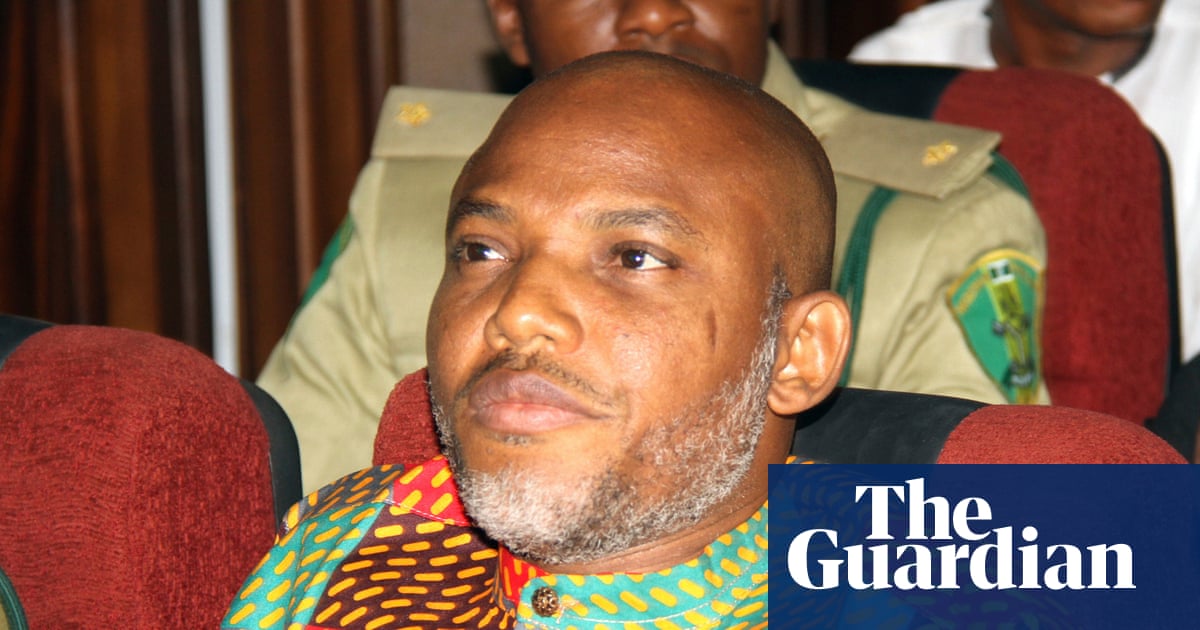Nnamdi Kanu, Biafran Separatist Leader, Convicted of Terrorism in Nigeria: A Deep Dive into IPOB's Violent Activities
 Nigeria
Political Justice
Nigeria
Political Justice

Nigerian court convicts Biafran separatist Nnamdi Kanu of terrorism. The IPOB leader incited violence, leading to attacks and deaths in southeast Nigeria.
Nnamdi Kanu, Leader of Biafran Separatist Movement, Convicted of Terrorism in Nigeria
A Nigerian court has delivered a significant verdict, convicting Nnamdi Kanu, the prominent leader of the Indigenous People of Biafra (IPOB), on terrorism-related charges. The ruling by Judge James Omotosho stated that prosecutors successfully demonstrated Kanu's role in inciting attacks on both security personnel and civilians across Nigeria's southeastern region through his group, IPOB.
The Charges and Courtroom Drama
Judge Omotosho emphasized Kanu's clear intention to promote violence, declaring, “His intention was quite clear as he believed in violence. These threats of violence were nothing but terrorist acts.” During the trial, Kanu, who is 58 and also holds British citizenship, chose to represent himself after dismissing his legal team. His conduct led to him being ejected from the courtroom for “unruly behaviour,” where he challenged the legality of the charges, stating, “Which law states that you can charge me on an unwritten law? Show me... Any judgment declared in this court is a complete rubbish.”
A Troubled History of Arrests and Agitation
Kanu's journey through the Nigerian legal system began in October 2015 when he was first taken into state custody, facing serious charges including treasonable felony. After 18 months, he was granted bail, only to disappear. His re-emergence involved a controversial 2021 extradition from Kenya, an event his supporters decried as an "extraordinary rendition."
The IPOB movement itself stems from the aftermath of Nigeria's 18-month civil war, which concluded in 1970 with the reintegration of the short-lived nation of Biafra into Nigeria. Comprising the former eastern region, largely today's southeast, the area has seen numerous secessionist movements. These groups protest perceived political and economic marginalisation, often mobilising diaspora communities for financial support and even training militia in regional forests. IPOB, under Kanu's charismatic leadership, particularly through his broadcasts on Peckham-based Radio Biafra, became the most influential of these movements.
Escalating Violence and International Ties
While Kanu was in prison, a splinter group, the Biafran Government in Exile (BGIE), emerged. Its self-declared prime minister, Simon Ekpa, was himself sentenced to six years on terrorism-related charges by a Finnish court in September. Both IPOB and BGIE have been implicated in a campaign of terror in southeast Nigeria. Militants associated with these groups regularly enforce “sit-at-home days” on Mondays, using violence to ban business, schooling, and other activities.
The human cost has been severe. According to geopolitical risk consultancy SBM Intelligence, separatist militants have been linked to approximately 700 deaths since 2021. A recent incident in May 2024 in Abia state saw five soldiers and six other individuals killed in an ambush. The conflict has not been one-sided, with military personnel also facing accusations of human rights abuses.
In 2017, the same year Kanu was arrested, the Nigerian government officially proscribed IPOB as a terrorist organisation. Kanu's legal and political efforts have extended internationally, including hiring US lobby firms, one reportedly owned by former congressman Jim Moran. These lobbying activities have been speculatively linked in Nigerian reports to the Trump administration's designation of Nigeria as a "country of particular concern" (CoPC), accompanied by unproven claims of a "Christian genocide" in the north. Kanu himself reportedly wrote to then-President Trump, alleging a "Judeo-Christian genocide" in southeast Nigeria.
This conviction marks a critical moment in Nigeria's ongoing struggle with secessionist movements and the challenge of maintaining national unity amidst regional grievances.